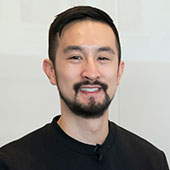Designing IoT Products to Connect the World
Ryan Lee (MMM '16) talks about how Northwestern's MMM program prepared him for his work as senior director of product management with Hologram, an Internet of Things startup.
Ryan Lee spent more than five years as a consultant, and he enjoyed helping clients solve their business and technology challenges. But he wanted more.
He yearned to add a new dimension to his career, a dimension focused on creativity and design. For that, he turned to Northwestern's MMM program, a dual-degree program between Northwestern Engineering and the Kellogg School of Management.
"MMM was the exact type of holistic business and design program that I knew would extend my thinking and capabilities," Lee said. "There was also the intangible value of joining a cohort of classmates with diverse experiences, joined together for a shared appreciation of business and design innovation."
 Lee (MMM '16) jumped into his studies and learned how to collaborate with and facilitate a team through a design process.
Lee (MMM '16) jumped into his studies and learned how to collaborate with and facilitate a team through a design process.
"The MMM program provides the practical experience and feedback to run through multiple design cycles to understand, research, brainstorm, and iterate through customer problems," he said. "The key insight may not come immediately, but understanding how to get there and think expansively once it's identified helps open up new opportunities for your customers."
Lee was ready to bring those opportunities to customers as a product manager, and he found a great fit at Hologram, an Internet of Things (IoT) startup that connects any device to any cellular network anywhere in the world. There was only one problem — there were no product positions.
Despite that, Lee liked what he saw in the company and joined as head of customer success.
“It was more important to get on the bus," he said, "than to sit in the perfect seat on the bus.”
Getting on the Hologram bus put Lee in a position to frequently interact with existing and potential customers. He heard they wanted to scale their IoT businesses, and that knowledge empowered him to eventually become a more effective product designer.
“Those customer touchpoints were an opportunity to dive into their actual pain points through a design research approach, understand their business's key drivers, and map those insights to how our business could best serve them,” he said.
Lee became a product manager after a year at the company and has been the senior director of product management for the past three. He's inspired by the power of IoT, which he believes makes the physical world smarter by becoming more connected.
Hologram’s products allow for the global coordination of everything from the world’s food supply to the thermostat and lighting settings in commercial and retail buildings. To do that remotely on a global scale, companies need to overcome the restrictions caused by exclusive cellular data networks in any given area.
“At Hologram, we're building the go-to cellular IoT connectivity platform for connected devices,” he said. “We provide the connectivity infrastructure and SIM cards so organizations can launch their IoT devices anywhere globally.”
One of the main things Lee enjoys about his role is that every day is different. The challenges change. The technologies change. But the ability to take a client's problem and use design thinking to solve it, that is a constant — thanks to MMM.
"In a rapidly changing organization, the priorities will not always be clear, and there will be an infinite list of potential projects," Lee said. "The MMM program provided me with a skill set to understand customer experiences through the design innovation process and evaluate key business drivers to help focus on what's important."
